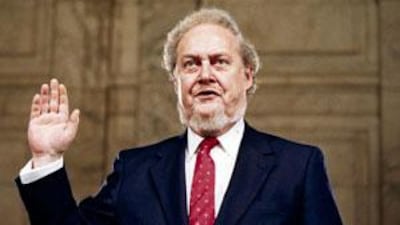The term "borked" entered the lexicon of US politics after the bruising 1987 confirmation battle over Robert Bork to serve on the US Supreme Court. When Mr Bork told the Senate judiciary committee that there was no constitutional "right to privacy" he seemed out of the mainstream of US thinking. But to this day, many of his backers say he was "borked" - denied something he deserved - simply because of political agendas, which they argue should not play a role in the confirmation of Supreme Court justices.
Judge Sonia Sotomayor's battle against Republican assertions this week that she would bring a liberal, activist agenda to the country's highest court highlight the reality that controversy and political agendas have always played a part in the nomination process. They did not start with Robert Bork, who had a long paper trail of legal opinions to be scrutinised. "Throughout American history, [Supreme] Court confirmations have occasionally become controversial, with nominees being turned down or withdrawing for various reasons," Larry Sabato, the director of the Center for Politics at the University of Virginia, wrote in an e-mail. "Every confirmation is a potential fight that gets nasty and personal, and requires the parties to perform kabuki theatre for their party base."
A few years after the US constitution was ratified, George Washington in 1795 installed John Rutledge as the Supreme Court's chief justice during a Senate recess. A few weeks after his appointment, the former South Carolina governor denounced the Jay Treaty dealing with issues left over from the Revolutionary War with England. He said "that he had rather the president should die than sign that puerile instrument" - and that he "preferred war to an adoption of it".
That enraged the Federalists, who then controlled the Senate, and they rejected his appointment. President Grover Cleveland's nomination of his secretary of the interior, Lucius Lamar, in 1888, to the Supreme Court serves as a reminder that there is nothing new under the sun as far as politics and human nature are concerned. As the first Southerner to be nominated since the end of the Civil War two decades earlier, he was accused of being too aligned with the region and of helping a woman get a government job in exchange for sex. Despite the charges, he was confirmed but served only five years until his death in 1893.
Mindful of history in picking Ms Sotomayor, who would be the first Hispanic to serve on the court, President Barack Obama said: "Experience being tested by obstacles and barriers, by hardship and misfortune; experience insisting, persisting and ultimately overcoming those barriers. It is experience that can give a person a common touch of compassion; an understanding of how the world works and how ordinary people live. And that is why it is a necessary ingredient in the kind of justice we need on the Supreme Court."
This ignited a backlash from those who saw the "empathy factor" being placed above judicial acumen. Go back 93 years and Louis Brandeis became the first Jew to serve on the high court, but not before going through a battle that rivals today's in intensity and personal animosity. Brandeis was active in the Zionist movement and involved in efforts to reform labour laws. Both The New York Times and The Wall Street Journal opposed him, and a former president, William Howard Taft, called his nomination "an evil and a disgrace".
Brandeis would serve on the high court for 23 years, becoming one of its most influential justices ever. The most memorable nomination fight of recent times came when George H W Bush chose Clarence Thomas for the court in 1991. The hearings were embroiled in a riveting he said-she said controversy. Anita Hill, a former aide with whom Mr Thomas worked at the equal employment opportunity commission, accused him of crass sexual harassment. He denied the allegations, calling the hearings a "hi-tech lynching".
A deeply divided Senate confirmed him by 52-48 vote. "The one-two punch of Robert Bork in 1987 and Clarence Thomas in 1991 changed the confirmation hearings forever," Prof Sabato said. "The court itself has become much more important since the early 1950s, and in a long series of cases it has reconfigured American democracy in ways the elective branches would not necessarily have approved - or not at the time. This may be good, this may be bad, but it's a fact that has raised the stakes enormously for court appointments."
rpretorius@thenational.ae

